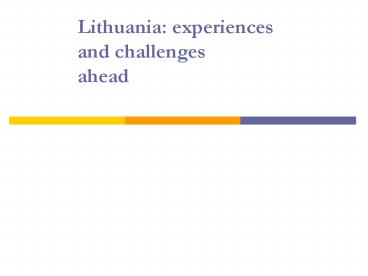Lithuania: experiences and challenges - PowerPoint PPT Presentation
1 / 14
Title:
Lithuania: experiences and challenges
Description:
To ensure accessibility of all school types introducing formal and non-formal ... (From the materials of the Dakar World Education Forum) ... – PowerPoint PPT presentation
Number of Views:22
Avg rating:3.0/5.0
Title: Lithuania: experiences and challenges
1
Lithuania experiences and challenges ahead
2
Educating students with SEN analysis of the
situation (1)
3
Educating students with SEN analysis of the
situation (2)
4
Educating students with SEN analysis of the
situation (3)
5
Educating students with SEN analysis of the
situation (4)
6
Educating students with SEN analysis of the
situation (5)
7
Promoting an inclusive approach in education
policy (1)
- The state educational strategy for the years
2003-2012 and the programme of its
implementation - To implement ideas of "A School for All" into a
real Lithuanian school practice - To ensure accessibility of all school types
introducing formal and non-formal educational
programmes to learners with SEN and provide an
opportunity to them to learn at environment that
meets their needs - To gradually decrease the number of special
(boarding) schools and along with this to
facilitate creating resource centres the most
advanced special (boarding) schools to be
transformed into resource centres
8
Promoting an inclusive approach in education
policy (2)
- The Law on Education (2003)
- 15.3. Special needs education can be provided by
any school that offers compulsory or
comprehensive education, also by other
educational providers, and sometimes - special
schools - 15.5. Persons with SENs... can acquire education
and/or qualification. The time needed for formal
education can be prolonged for a SEN person - 34.3. Accessibility of education to persons with
SENs ensured by adapting school premises,
providing psychological, special pedagogical and
special assistance as well as special assistance
devices, special educational materials and other
ways in accordance with legislation
9
Improving the system of provision of special
pedagogical and psychological assistance
- The 3-level Model of Provision of Special
Pedagogical and Psychological Assistance and the
Programme of its implementation in 2003-2005 - The 1st level A School level detection,
assessment, provision Initial detection of a
students problem a teachers and the School
Special Needs Education Commissions
responsibility - The 2nd level a local Pedagogical Psychological
Service assessment and evaluation,
recommendations for further education and
provision - The 3rd level National Centre for Special Needs
Education and Psychology
10
Improving the system of provision of special
pedagogical and psychological assistance
- The order of financial assistance for
municipalities that decide to establish municipal
pedagogical psychological services (2004) The
MoES allocated 1 mill. Litas for the year 2004 - For the EU Structural Funds two national
projects Prevention of drop-outs and
Developing a network of PPS have been prepared
and started being implemented in the year 2005 - The changes in the Law of the Local authorities
passing some of responsibility for
pedagogical and psychological assistance
11
Vocational training of persons with SENs
- The Concept of vocational education and training
of persons with SENs (2004) - The draft of the new Law on Vocational Education
and Training (2005) - SEN persons who have not achieved compulsory
education according to the national standards
have a possibility to attend vocational training
programmes at different levels (I, II, III) - Transition between the compulsory school, the
vocational training school and a labour market
must be ensured, ITP is needed
12
The main challenges ahead (1)
- To further improve the national educational
policy to ensure "A School for All" ideas are
being implemented effectively - To solve a problem with the two Laws available
the new Law on Education (2003) and the Law on
Special Education (1998) - To further improve the system of financing of the
education system from the year 2005 plus 20
were allocated to the funding of the so-called
"back-packs" for each pupil with SENs in a
mainstream setting. Some funding from these "back
packs" might go to funding of local PPS, teacher
assistants, additional pedagogical and
psychological assistance, text books etc. - To improve the system of provision of special
educational material and ICT according to the
Model of Provision of Special Educational
Material that has been created in recent years
13
The main challenges ahead (2)
- To introduce the new Concept of Teacher
Education and to ensure that each graduate has
necessary knowledge for dealing with the diverse
student body including pupils with SENs - To further develop the In-service Teacher
Training system so that teachers can have an
access to a bigger variety of programs regarding
inclusive education, to improve the Centre for
Quality Assessment in In-Service Training - To further promote international cooperation
- To take an active part in activities of the
European Agency for Development in Special Needs
Education
14
- "We are all at different pace but nonetheless
striving to develop Inclusive Education or School
for All learners, where we put full
participation, equality and community at the
centre - as a clear dimension of quality in
education - (From the materials of the Dakar World Education
Forum)































